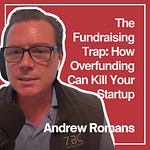Peter Livingston, founder of Unpopular VC, shared his insights on angel investing and working with startups globally in my recent podcast interview.
My next podcast guest will be Guy Kawasaki on March 7th. I had the opportunity to speak with him about his new book Think Remarkable and am excited to share this episode.
With over a decade of experience and 400+ investments under his belt, Peter emphasized the importance of diversification and long time horizons for new angel investors. He recommends starting small with check sizes around $1-5k to build a portfolio of at least 50-100 companies. Peter cautions that liquidity often takes 8-15 years, so angels shouldn't concentrate too heavily in just 1-2 startups.
Through Unpopular VC's unique model, Peter and his partner Thibault Reichelt have deployed $68 million into 400+ companies so far. They take a bottoms-up approach to find talented founders worldwide building compelling businesses, regardless of trends or location.
Speed and conviction are critical to get into the best deals before the herd. Peter explains how their lean, autonomous team empowers them to move fast and make contrarian bets. As a result, they've gotten into several succesfull startups early like Zepto and Yassir.
Overall, our discussion covered Peter's journey from startups to angel investing, sourcing great founders globally, portfolio management for 4000+ LPs, and key lessons learned. Read on for a summary of the key questions and responses from our conversation.
“Like and Comment Club”
I, am excited to introduce a unique opportunity: a special closed group exclusively for those who actively like and comment on our newsletter. By engaging with our content, you can join this inner circle where we will have closer interactions and deeper discussions. This is your chance to be directly connected with me and be part of a community that values active participation and insightful exchanges.
Don't miss out on being part of this engaging group!
Investment Commitees
Peter believes that investment committees are "really dumb" and much less effective than individual partners making decisions.
Investment committees are slow and miss out on the best deals
Good investments often seem bad initially and need contrarian thinking
Requiring committee approval biases away from non-consensus bets
Peter and his partner have full autonomy to invest independently
This empowers them to move fast and make unpopular bets
Enables getting into extremely successful investments early
Big wins offset mistakes over time
Angel Investing Rules
The key is diversifying widely, starting small, investing consistently over decades, and taking a very long-term view. Patience, persistence, and the right expectations set you up for success.
Diversify widely - don't concentrate too heavily in 1-2 startups early on.
Start with very small check sizes - $1-5k to build experience over time.
Build a portfolio of at least 50-100 companies as you gain experience.
Understand the long time horizon - liquidity takes 8-10+ years.
Go slow and be patient - invest small amounts consistently over many years.
Expect that most startups will fail - prepare mentally and manage risk.
Get deal flow by establishing yourself as an active angel early on.
Look for founders with strong credentials and some concrete traction.
Accept and embrace mistakes as part of the messy world of investing.
Preserve capital to maintain flexibility in follow-on rounds.
Let great founders do their thing - avoid over-involvement.
Red Flags in Investor Meetings
The main red flag is when Peter doesn't believe a founder will be able to recruit the talent, capital, and customers needed to be successful over the long run. Track record, credibility, and compelling storytelling are key.
Lack of commitment/dedication from the founders
Founders who seem unlikely to recruit strong teams
Unrealistic projections or expectations on timing
No clear plan for raising future capital
Founders who can't articulate the risks/challenges
Bad signs around team dynamics or culture
Lack of passion/conviction around the problem/solution
Founders without relevant experience or credentials
No evidence of exceptional ability based on past achievements
No demo or concrete traction to give credibility
Unwillingness to acknowledge potential downsides
Overly complex business models or go-to-market
Markets that seem too small or hard to penetrate
No Investors Needed
I recently had the honor of interviewing Jason Fried, founder of 37 Signals, Basecamp, on my podcast. Jason provided so many fascinating insights about building a successful business by staying small and sticking to your values. In this post, I want to recap some of his key lessons that really resonated with me.














Share this post